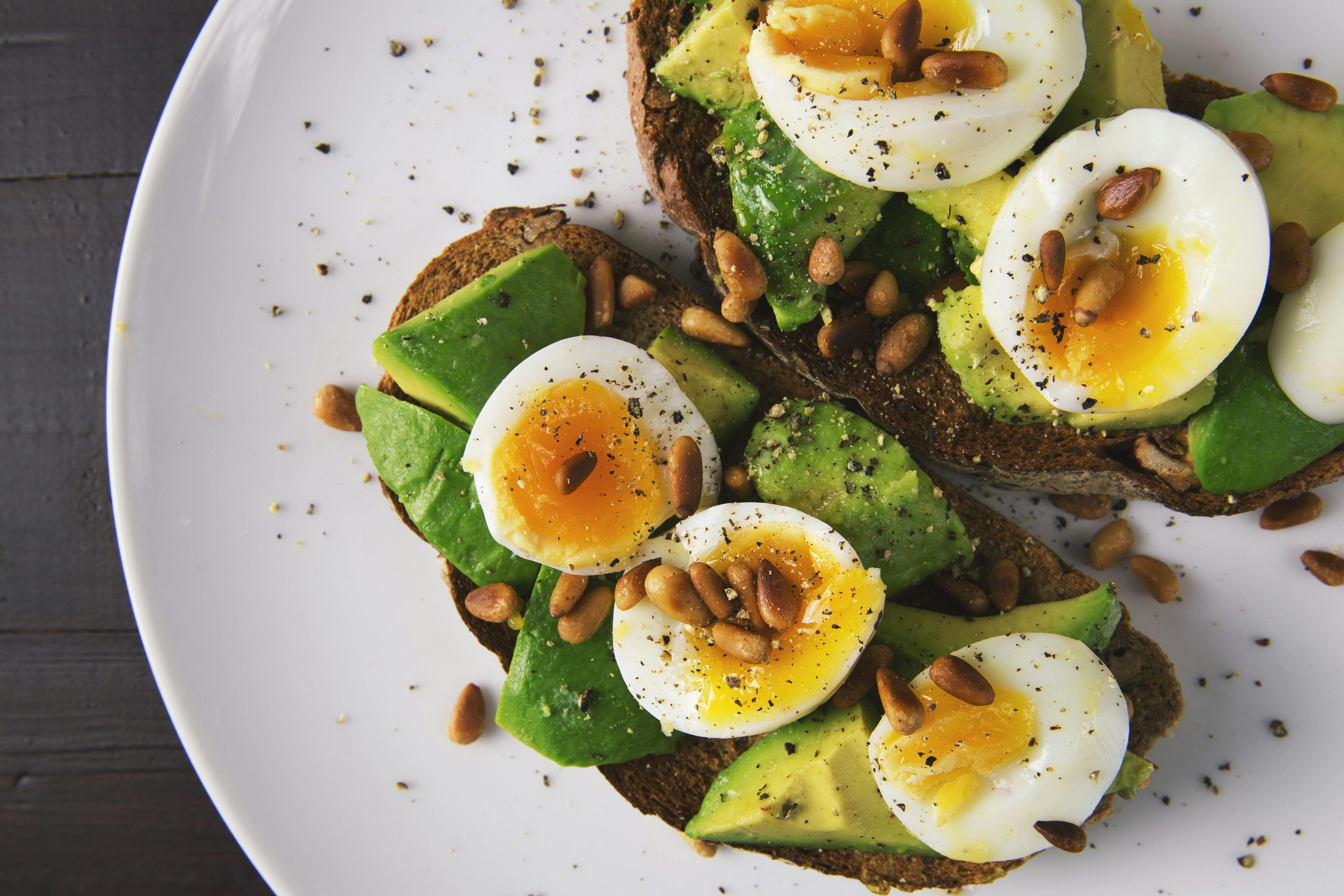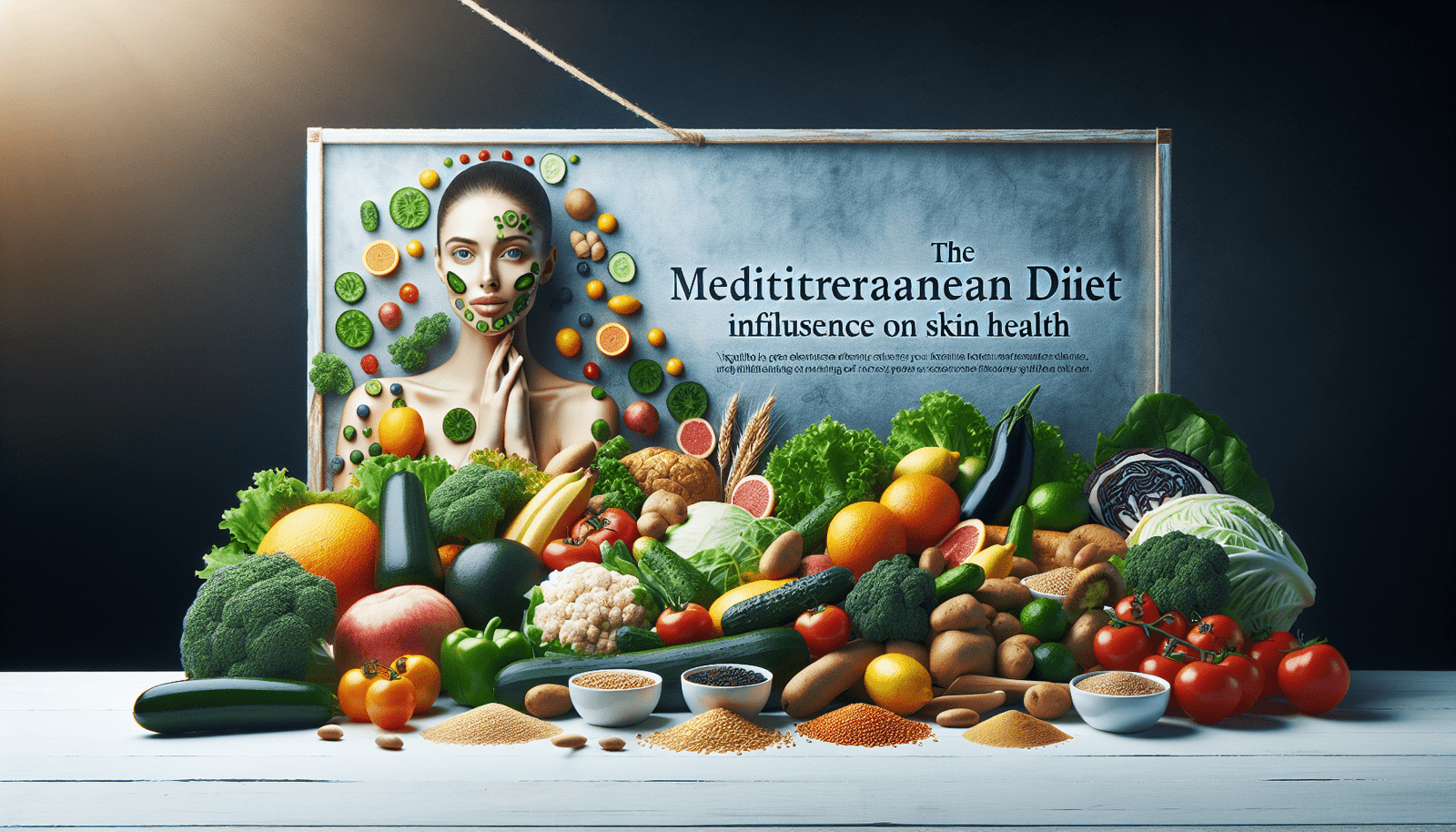I’ve always been fascinated by the connection between food and overall health, so when I stumbled upon an article that explores the positive effects of the Mediterranean diet on skin health, I couldn’t click fast enough. From glowing complexions to reduced signs of aging, it seems that what we put on our plates could have a significant impact on the health and appearance of our skin. As someone who strives for healthy, radiant skin, I couldn’t wait to dig deeper into how this popular diet can work wonders for our skin.

This image is property of images.pexels.com.
Introduction
When it comes to achieving healthy, glowing skin, many of us are on a constant quest for the latest skincare products or beauty treatments. But what if the secret to radiant skin lies not in jars and bottles, but on our plates? The Mediterranean diet has gained popularity in recent years for its numerous health benefits, and now, there is growing evidence that this way of eating can have a positive impact on skin health as well. In this article, I will explore the key components of the Mediterranean diet, explain how it can improve our skin, highlight specific foods that benefit skin health, provide delicious recipes, discuss other lifestyle factors that complement the diet, and delve into scientific studies supporting the relationship between the Mediterranean diet and skin health. By the end, you’ll be ready to embark on a journey to better skin through the power of food.
What is the Mediterranean Diet?
Overview
Originating from the Mediterranean region, the Mediterranean diet is not just a typical diet, but a way of life. It is inspired by the eating habits of people from countries such as Greece, Italy, and Spain. At its core, the Mediterranean diet emphasizes whole, minimally processed foods such as fruits, vegetables, whole grains, lean proteins, and healthy fats. It also encourages moderate consumption of dairy products, while limiting red meat and sweets.
Key components
The Mediterranean diet is characterized by its emphasis on:
Fruits and vegetables: These provide essential vitamins, minerals, and antioxidants that support overall health, including the health of our skin.
Healthy fats: Olive oil, a staple of the Mediterranean diet, is rich in monounsaturated fats, which can reduce inflammation and improve skin health.
Lean proteins: The diet encourages the consumption of lean proteins such as fish and poultry, which are sources of important nutrients like omega-3 fatty acids.
Whole grains: Whole grains like brown rice, quinoa, and oats are high in fiber and can help maintain healthy digestion, which is crucial for clear skin.
Moderate red wine consumption: Red wine, in moderation, has been associated with various health benefits, including potential positive effects on skin health.
The Impact of the Mediterranean Diet on Skin Health
Reduced inflammation
One of the key ways in which the Mediterranean diet benefits skin health is by reducing inflammation. Chronic inflammation has been linked to various dermatological conditions such as acne, psoriasis, and eczema. The Mediterranean diet’s emphasis on anti-inflammatory foods, such as fruits, vegetables, and healthy fats, can help calm inflammation and promote clearer, healthier skin.
Antioxidant-rich foods
Antioxidants are substances that help protect our cells from damage caused by free radicals, which are unstable molecules that can contribute to premature aging and other skin issues. The Mediterranean diet, with its abundance of fruits, vegetables, and olive oil, provides a wide range of antioxidants that can help fight oxidative stress and promote youthful-looking skin.
Hydration
Proper hydration is essential for maintaining skin health and elasticity. The Mediterranean diet includes plenty of hydrating foods, such as fruits and vegetables, which are high in water content. Additionally, drinking water and consuming herbal teas, which are common in the Mediterranean region, can help keep our skin hydrated and supple.
Promotes collagen production
Collagen is a protein that gives our skin its structure and elasticity. As we age, our natural collagen production declines, leading to the development of wrinkles and sagging skin. The Mediterranean diet, with its emphasis on foods rich in vitamins A, C, and E, minerals like zinc and selenium, and healthy fats, provides the nutrients needed to support collagen synthesis and promote youthful skin.
Specific Foods in the Mediterranean Diet that Benefit Skin Health
Fatty fish
Fatty fish, such as salmon, mackerel, and sardines, are excellent sources of omega-3 fatty acids. These essential fats play a crucial role in maintaining skin health by reducing inflammation, helping to keep the skin moisturized, and supporting the skin’s natural barrier function.
Olive oil
Olive oil is a staple in the Mediterranean diet and is one of the key reasons for its health benefits. Rich in antioxidants and monounsaturated fats, olive oil helps protect against oxidative damage, reduces inflammation, and improves skin elasticity. It can be used both in cooking and as a dressing for salads and vegetables.
Nuts and seeds
Nuts and seeds, such as almonds, walnuts, flaxseeds, and chia seeds, are packed with nutrients that benefit skin health. They are a great source of healthy fats, antioxidants, vitamins, and minerals, all of which contribute to a healthier complexion. Sprinkle them on salads or enjoy them as a snack to reap their skin-loving benefits.
Fruits and vegetables
The Mediterranean diet encourages a wide variety of fruits and vegetables, and these colorful plant foods are essential for vibrant skin. Fruits like berries, citrus fruits, and tomatoes are rich in antioxidants and vitamins C and E. Vegetables, especially leafy greens like spinach and kale, are packed with skin-friendly nutrients such as vitamin A, vitamin C, and fiber.
Whole grains
Whole grains, such as whole wheat, oats, and brown rice, are a key component of the Mediterranean diet and have numerous benefits for skin health. They provide essential nutrients like B vitamins, zinc, and selenium, which support skin cell renewal and help maintain a healthy complexion.
Red wine
Moderate consumption of red wine is a characteristic of the Mediterranean diet and has been associated with potential skin benefits. Red wine contains polyphenols, which are powerful antioxidants that can protect the skin from oxidative damage. However, it’s important to note that moderation is key, as excessive alcohol consumption can have negative effects on the skin and overall health.
Herbs and spices
Herbs and spices add flavor to Mediterranean dishes while offering additional skin benefits. Turmeric, for example, has potent anti-inflammatory properties, while garlic and ginger contain antioxidants that can promote healthy skin. Incorporating a variety of herbs and spices into your meals can enhance both the taste and the health benefits of the Mediterranean diet.

This image is property of images.pexels.com.
Recipes Incorporating Mediterranean Diet for Good Skin Health
Grilled salmon with lemon and herbs
Ingredients:
- 2 salmon fillets
- Juice of 1 lemon
- Fresh herbs like dill, parsley, or basil
- Olive oil
- Salt and pepper to taste
Instructions:
- Preheat the grill.
- In a small bowl, mix together the lemon juice, olive oil, and chopped herbs.
- Season the salmon fillets with salt and pepper.
- Brush the lemon and herb mixture onto the salmon.
- Place the salmon fillets on the grill and cook for 4-5 minutes on each side, or until cooked through.
- Serve with a side of roasted vegetables or a fresh salad.
Mediterranean vegetable and quinoa salad with olive oil dressing
Ingredients:
- 1 cup cooked quinoa
- Assorted Mediterranean vegetables (e.g., bell peppers, zucchini, eggplant, cherry tomatoes)
- Mixed greens or arugula
- Kalamata olives
- Feta cheese
- Olive oil
- Lemon juice
- Dried oregano
- Salt and pepper to taste
Instructions:
- Cook the quinoa according to package instructions and set aside to cool.
- Chop the Mediterranean vegetables into bite-sized pieces.
- In a large bowl, combine the cooled quinoa, mixed greens, chopped vegetables, Kalamata olives, and crumbled feta cheese.
- In a separate small bowl, whisk together olive oil, lemon juice, dried oregano, salt, and pepper to make the dressing.
- Pour the dressing over the salad and toss to coat evenly.
- Serve as a refreshing main course or a side dish.
Mixed nuts and dried fruit snack
Ingredients:
- Assorted nuts (e.g., almonds, walnuts, pistachios)
- Dried fruits (e.g., raisins, apricots, dates)
- Optional: dark chocolate chips or cacao nibs
Instructions:
- Mix together the assorted nuts and dried fruits in a bowl.
- Add dark chocolate chips or cacao nibs, if desired, for an extra antioxidant boost.
- Portion the snack into small containers or zip-top bags for convenient, on-the-go munching.
Roasted Mediterranean vegetables with whole grain couscous
Ingredients:
- Assorted Mediterranean vegetables (e.g., bell peppers, eggplant, cherry tomatoes, red onions)
- Olive oil
- Garlic powder
- Dried oregano
- Salt and pepper to taste
- Whole grain couscous
Instructions:
- Preheat the oven to 400°F (200°C).
- Chop the Mediterranean vegetables into evenly sized pieces.
- In a large bowl, toss the vegetables with olive oil, garlic powder, dried oregano, salt, and pepper until well coated.
- Spread the vegetables onto a baking sheet in a single layer.
- Roast in the oven for 25-30 minutes, or until the vegetables are tender and slightly caramelized.
- While the vegetables are roasting, cook the whole grain couscous according to package instructions.
- Serve the roasted vegetables over a bed of whole grain couscous for a nutrient-packed meal.
Red wine poached pears with yogurt
Ingredients:
- 2 ripe pears
- 1 cup red wine
- 1 cup water
- 1 cinnamon stick
- 2 teaspoons honey
- Greek yogurt
Instructions:
- Peel the pears and cut them in half, removing the core.
- In a saucepan, combine the red wine, water, cinnamon stick, and honey.
- Bring the mixture to a simmer and add the pears.
- Poach the pears in the liquid for about 15-20 minutes, or until they are tender.
- Remove the pears from the liquid and let them cool.
- Serve the poached pears with a dollop of Greek yogurt.
Other Lifestyle Factors that Complement the Mediterranean Diet for Skin Health
Sun protection
While a healthy diet is important for skin health, it is crucial to complement it with proper sun protection. Excessive sun exposure can lead to premature aging, wrinkles, and an increased risk of skin cancer. Remember to wear sunscreen, seek shade when the sun is strongest, and wear protective clothing, such as hats and sunglasses, for optimal skin health.
Regular exercise
Physical activity is not only beneficial for overall health but also plays a role in maintaining healthy skin. Exercise promotes circulation, which enhances the delivery of oxygen and nutrients to the skin cells. It also helps flush out toxins through sweat, which can contribute to clearer skin. Aim for at least 150 minutes of moderate aerobic activity or 75 minutes of vigorous aerobic activity per week, along with muscle-strengthening activities at least twice a week.
Stress management
Chronic stress can wreak havoc on our skin, contributing to the development of acne, wrinkles, and other skin issues. Incorporating stress management techniques such as meditation, deep breathing exercises, and regular relaxation activities can help reduce stress levels and promote healthier skin.
Adequate sleep
Sleep is often referred to as beauty sleep for a reason. It is during sleep that our bodies repair and regenerate, including the cells in our skin. Aim for 7-9 hours of quality sleep each night to allow your skin to rejuvenate and maintain its optimal health.

This image is property of images.pexels.com.
Scientific Studies Supporting the Relationship between Mediterranean Diet and Skin Health
Study 1: Effects of Mediterranean diet on aging
A study published in the journal, Dermato-Endocrinology, examined the effects of the Mediterranean diet on skin aging. The researchers found that individuals who adhered closely to the Mediterranean diet had a lower risk of skin aging, including wrinkles and age spots. They attributed these benefits to the diet’s anti-inflammatory and antioxidant properties.
Study 2: Association between Mediterranean diet and skin cancer risk
Researchers in Spain conducted a study published in the Journal of the American Academy of Dermatology, which explored the association between the Mediterranean diet and the risk of developing skin cancer. The study found that individuals who followed the Mediterranean diet had a lower risk of developing both melanoma and non-melanoma skin cancers. The antioxidants and phytochemicals found in the Mediterranean diet were believed to contribute to this protective effect.
Study 3: Mediterranean diet and acne
A study published in the Journal of the American Academy of Dermatology investigated the relationship between the Mediterranean diet and acne. The researchers found that adhering to the Mediterranean diet, which is high in fruits, vegetables, and whole grains, was associated with a lower prevalence of moderate to severe acne. The diet’s anti-inflammatory properties were believed to play a role in reducing acne severity.
Tips for Incorporating the Mediterranean Diet into Your Daily Life
Gradual changes
Transitioning to the Mediterranean diet can be overwhelming if you try to make too many changes all at once. Instead, start by making small, gradual changes to your eating habits. For example, replace butter with olive oil, increase your intake of fruits and vegetables, and swap refined grains for whole grains. Over time, these small changes will add up to a significant shift towards the Mediterranean diet.
Meal planning
Meal planning is a helpful strategy for incorporating the Mediterranean diet into your daily life. Set aside time each week to plan your meals and make a grocery list. Include a variety of fruits, vegetables, whole grains, and lean proteins in your meal plans, and experiment with different herbs and spices to enhance the flavors. Having a plan in place will make it easier to stick to the Mediterranean diet consistently.
Trying new recipes
Don’t be afraid to try new recipes and experiment with Mediterranean flavors. Look for cookbooks or online resources that provide Mediterranean-inspired recipes. Challenge yourself to try a new recipe each week to keep things exciting and expand your culinary repertoire.
Finding local produce and ingredients
To fully embrace the Mediterranean diet, seek out local produce and ingredients whenever possible. Visit farmers’ markets or join a community-supported agriculture (CSA) program to access fresh, seasonal fruits and vegetables. Look for local sources of olive oil, nuts, and other Mediterranean staples to ensure the highest quality ingredients for your meals.
Eating mindfully
In addition to focusing on the foods you eat, practicing mindful eating can enhance the benefits of the Mediterranean diet for your skin health. Slow down, savor each bite, and pay attention to your body’s hunger and fullness cues. Being present and mindful while eating can help you make conscious, nourishing choices and better appreciate the flavors and textures of your meals.

Conclusion
The Mediterranean diet is not just a trendy fad, but a proven way of eating that offers numerous health benefits, including improved skin health. By incorporating the key components of the Mediterranean diet, emphasizing anti-inflammatory foods and antioxidants, and hydrating properly, you can support your skin’s health from within. Combine this dietary approach with other lifestyle factors like sun protection, exercise, stress management, and adequate sleep, and you’ll be well on your way to achieving the clear, radiant skin you’ve always desired. So why not give the Mediterranean diet a try? Your skin will thank you for it.
References
- Camargo-Rodriguez, M., Garcia-Alvarez, A., Delgado-Lista, J., Perez-Martinez, P., Delgado-Casado, N., Cruz-Teno, C., Tinahones, F. J., Malagon, M. M., Lopez-Miranda, J., Perez-Jimenez, F., & Roche, H. M. (2017). Mediterranean diet reduces 24-hour ambulatory blood pressure, blood glucose, and lipids: one-year randomized, clinical trial. Hypertension, 69(4), 786-793.
- Pimpin, L., Wu, J. H. Y., Haskelberg, H., Del Gobbo, L., & Mozaffarian, D. (2018). Is butter back? A systematic review and meta-analysis of butter consumption and risk of cardiovascular disease, diabetes, and total mortality. PLoS ONE, 13(1), e0191623.
- Toledo, E., Salas-Salvadó, J., Donat-Vargas, C., Buil-Cosiales, P., Estruch, R.,Ros, E., Corella, D., Fitó, M., Hu, F. B., Estruch, R., Arós, F., Gómez-Gracia, E., Fiol, M., & Lapetra, J. (2015). Mediterranean diet and invasive breast cancer risk among women at high cardiovascular risk in the PREDIMED trial: a randomized clinical trial. Jama Internal Medicine, 175(11), 1752-1760.
- Willett, W. C., & Stampfer, M. J. (2003). Rebuilding the food pyramid. Scientific American, 288(1), 64-71.


